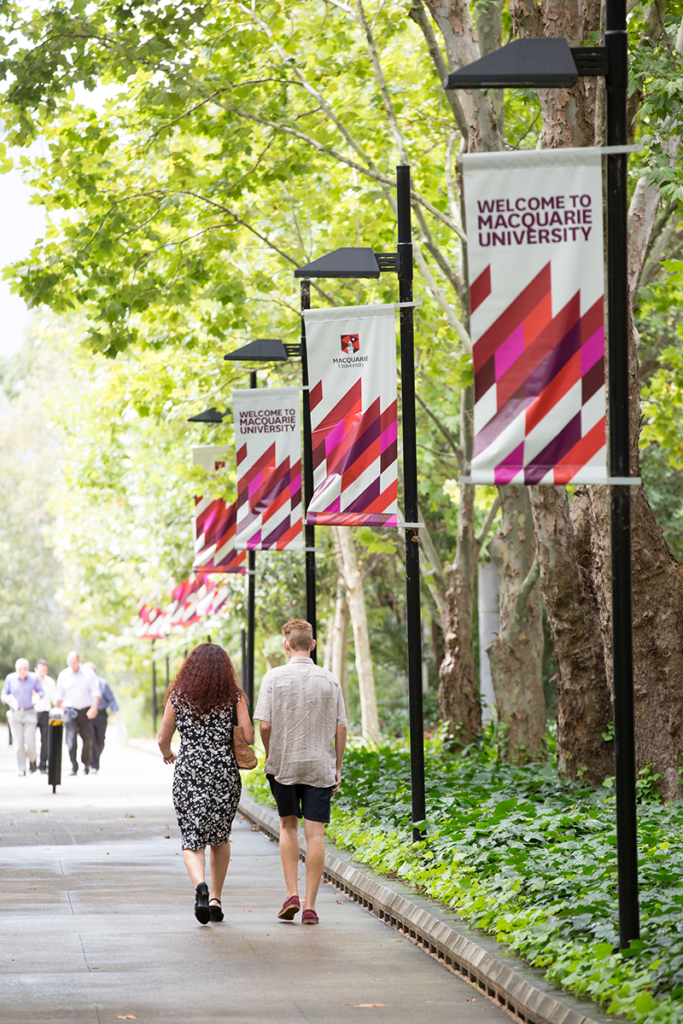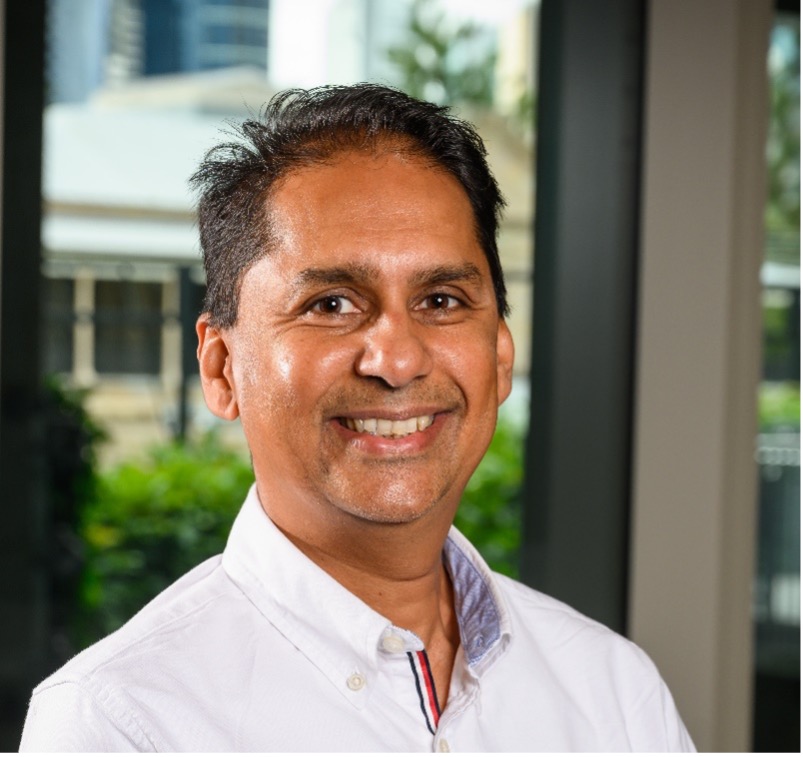UECA PD Fest 2024
F.I.T for 2025
Face-to-Face Event – Saturday, 09 November 2024
Access all content at UECA Online
You can access all videos and download presentation materials from UECA Online.
As we shape up for 2025, our programs and practices are increasingly more Flexible. Innovative. Transformative (F.I.T).
This year’s UECA PD Fest is hosted by Macquarie University College (Macquarie Park, Sydney) on Saturday 9th November 2024.
The F.I.T for 2025 program takes a pulse check on the teaching and learning practices that define our time and considers what it takes to be F.I.T for 2025.
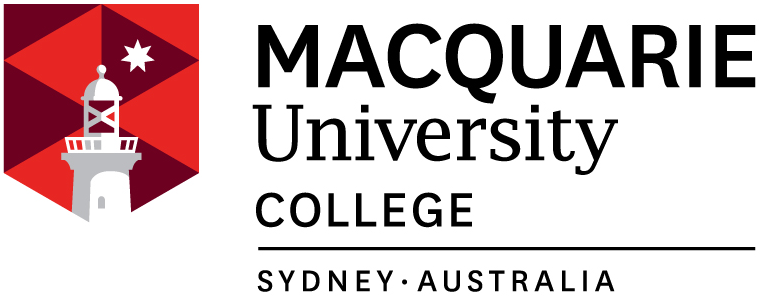
Location:
The Michael Kirby Building
17 Wally’s Walk
Macquarie University
Macquarie Park
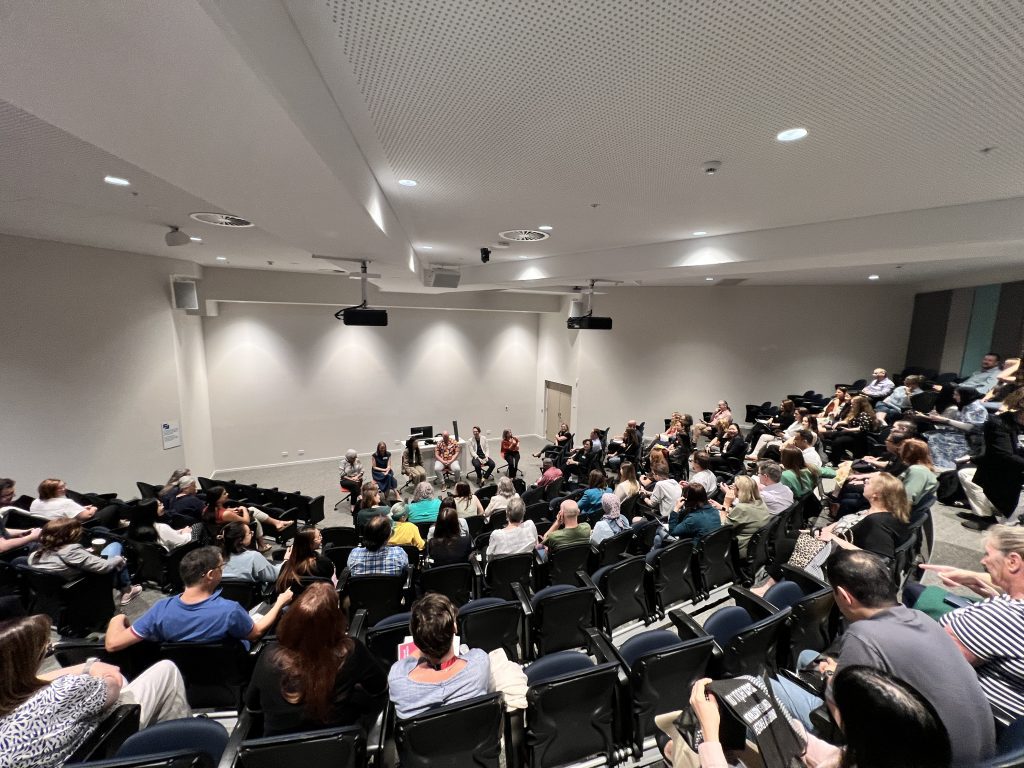
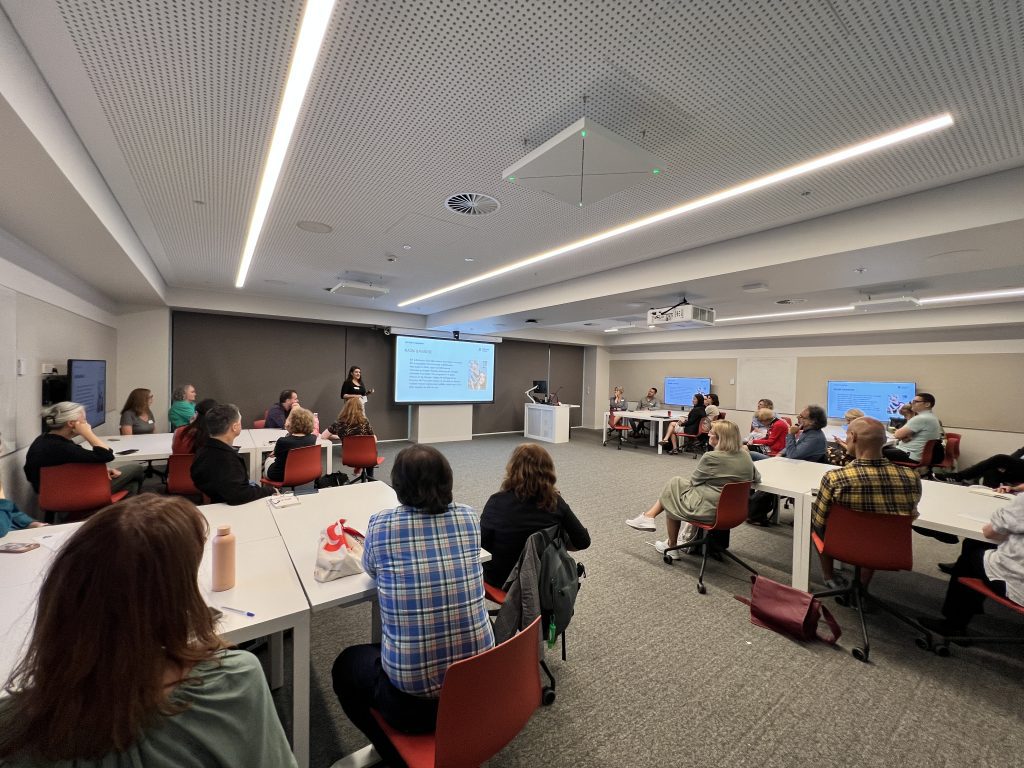

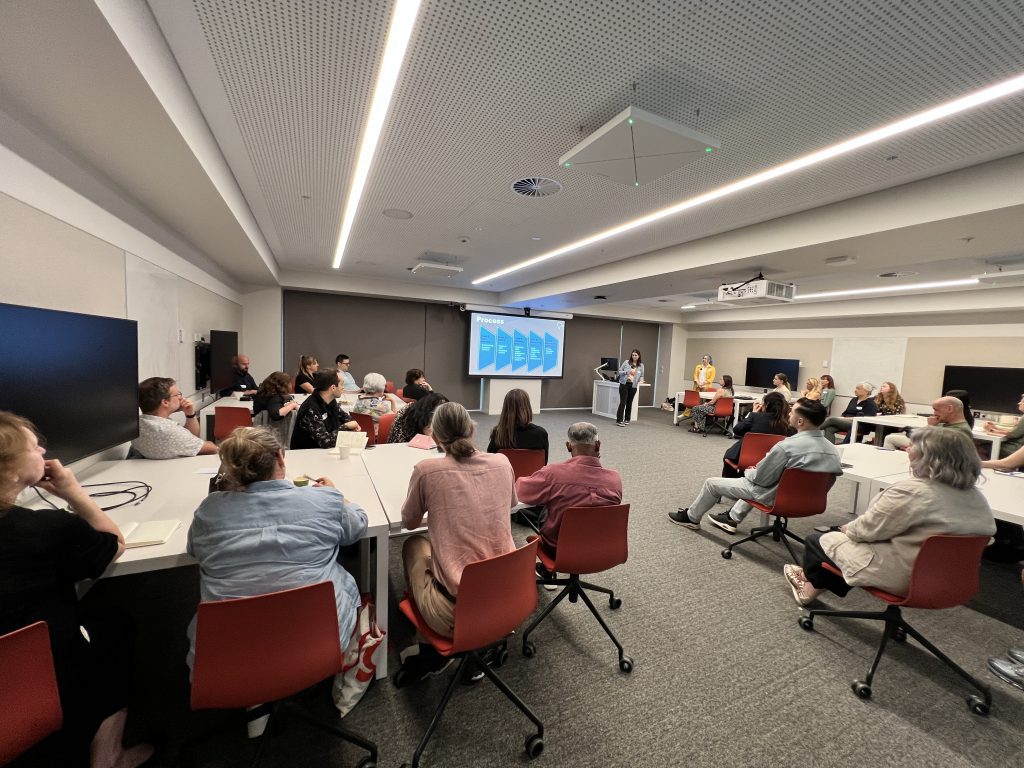

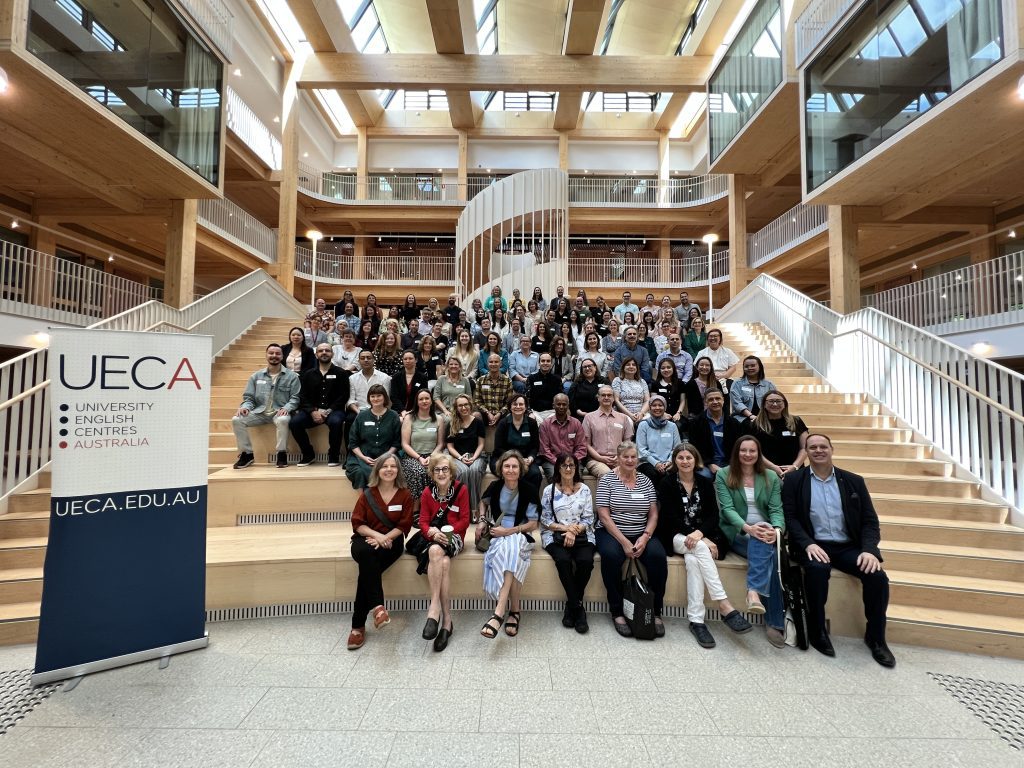
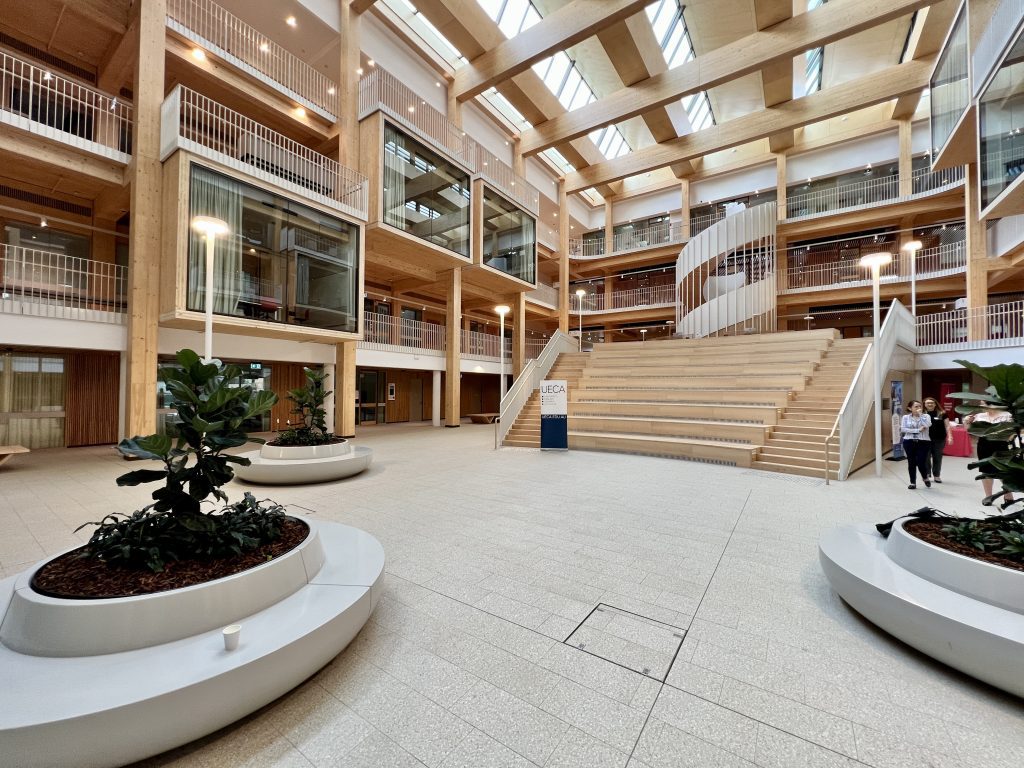

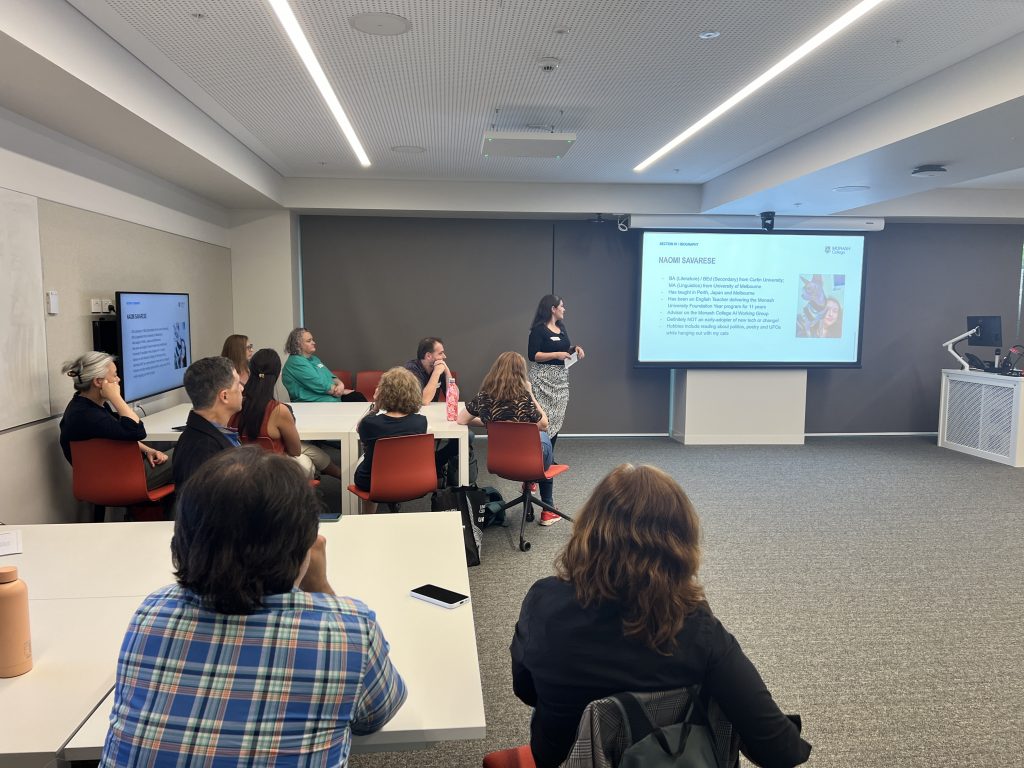

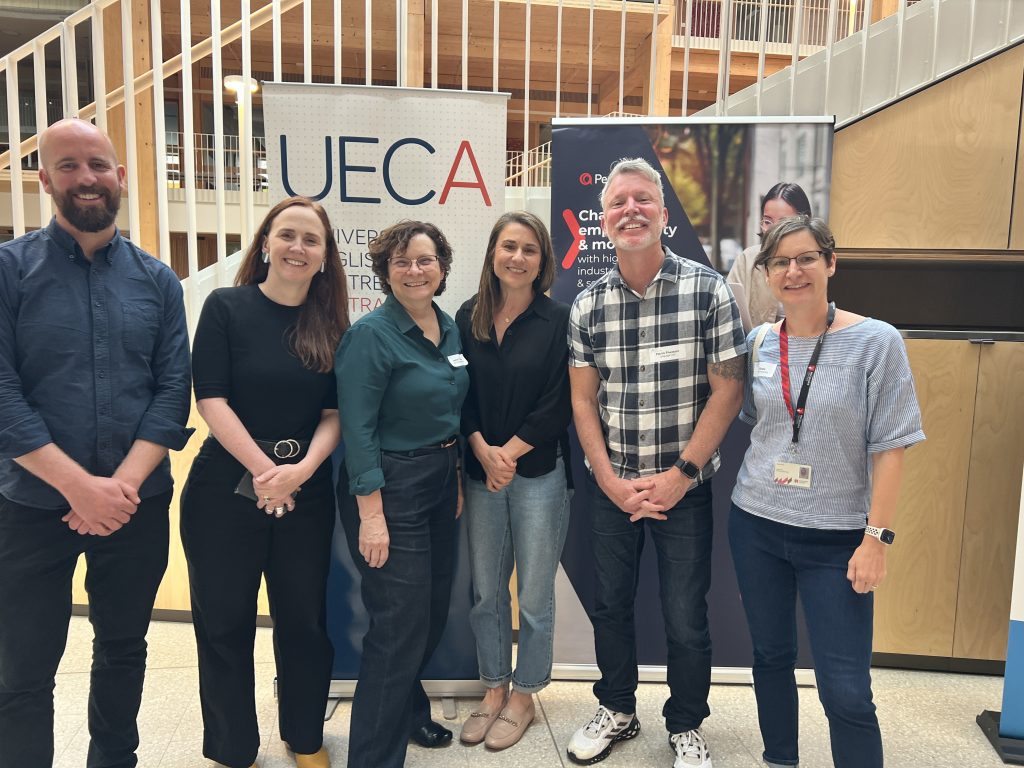
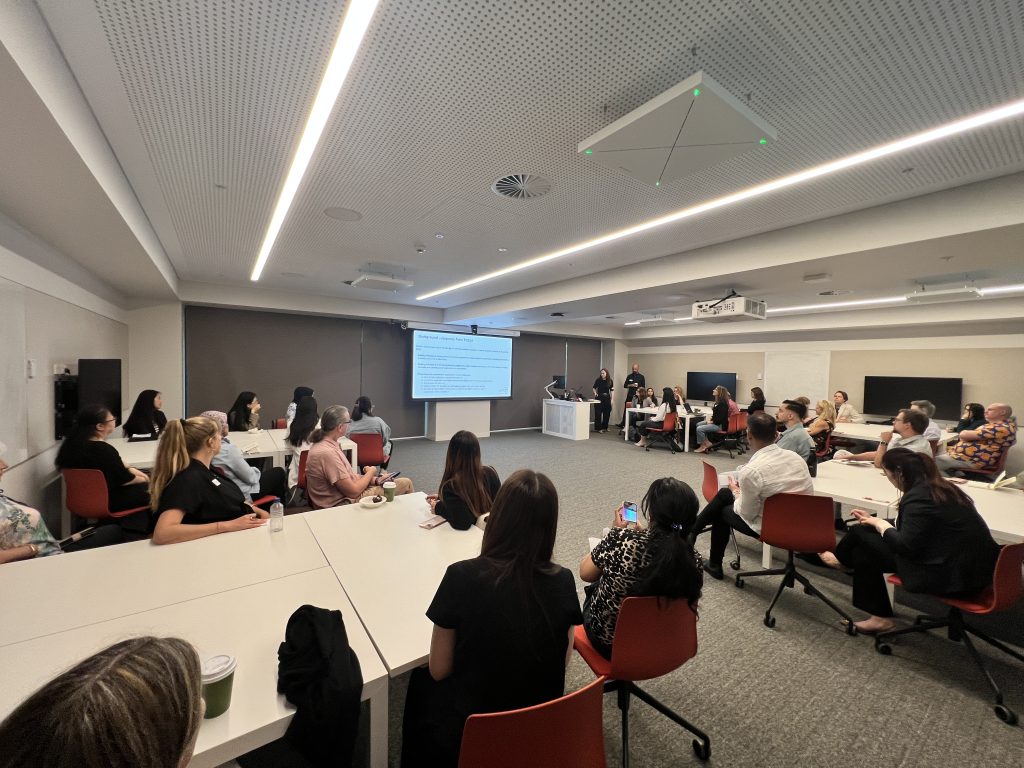
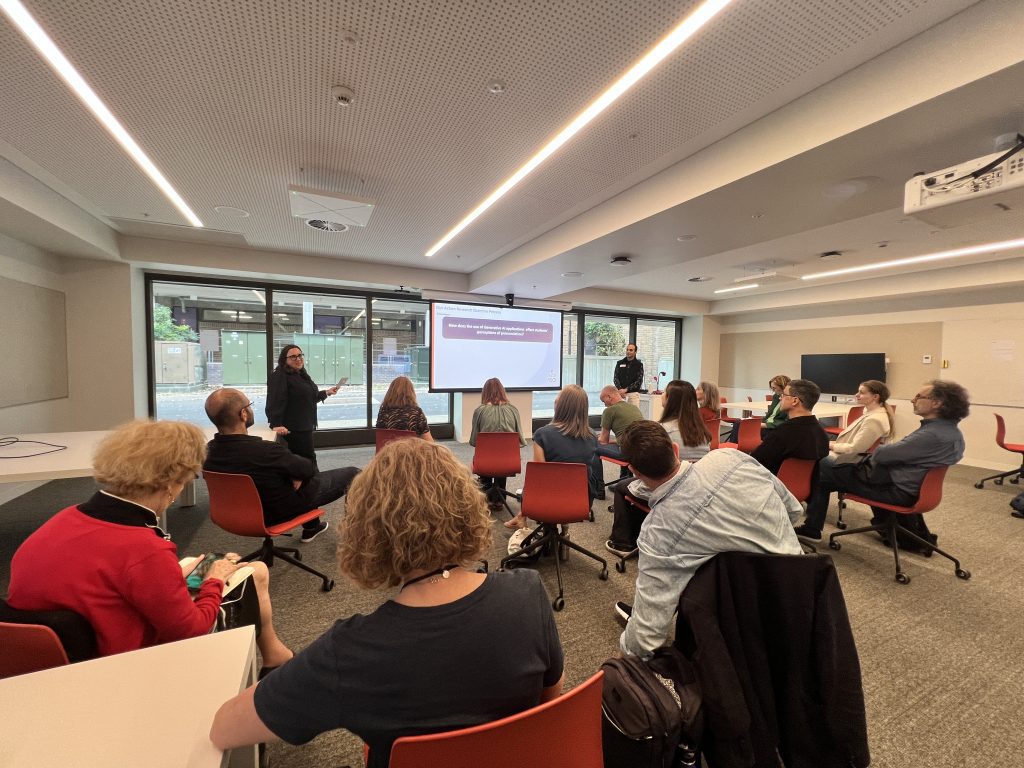
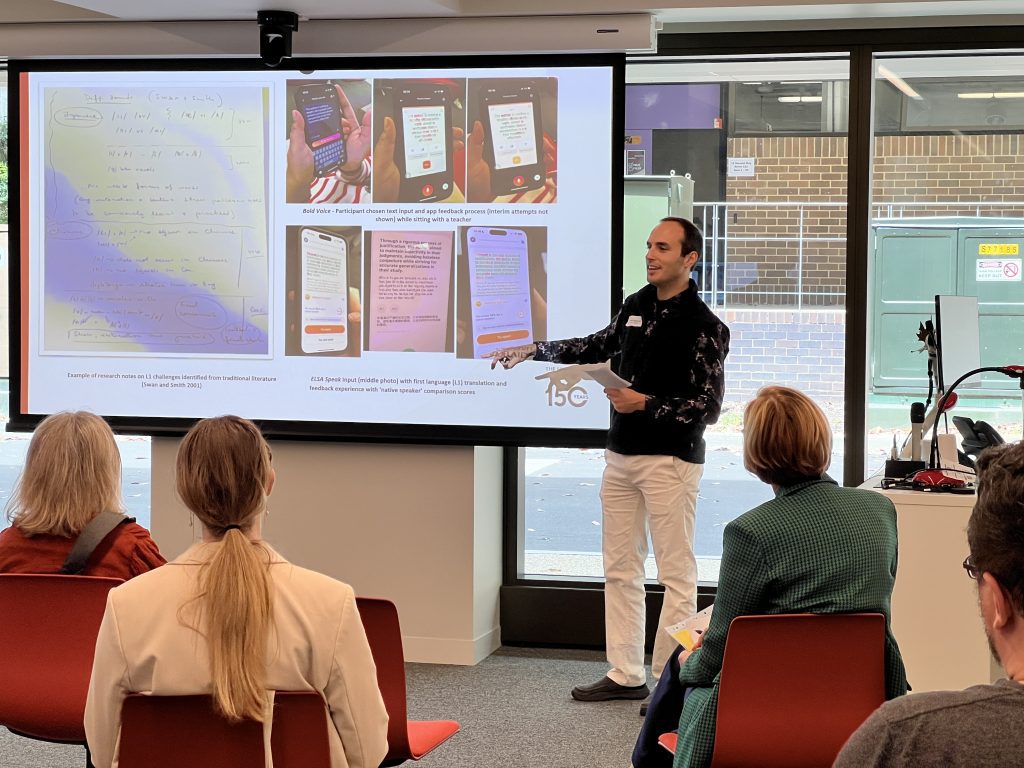
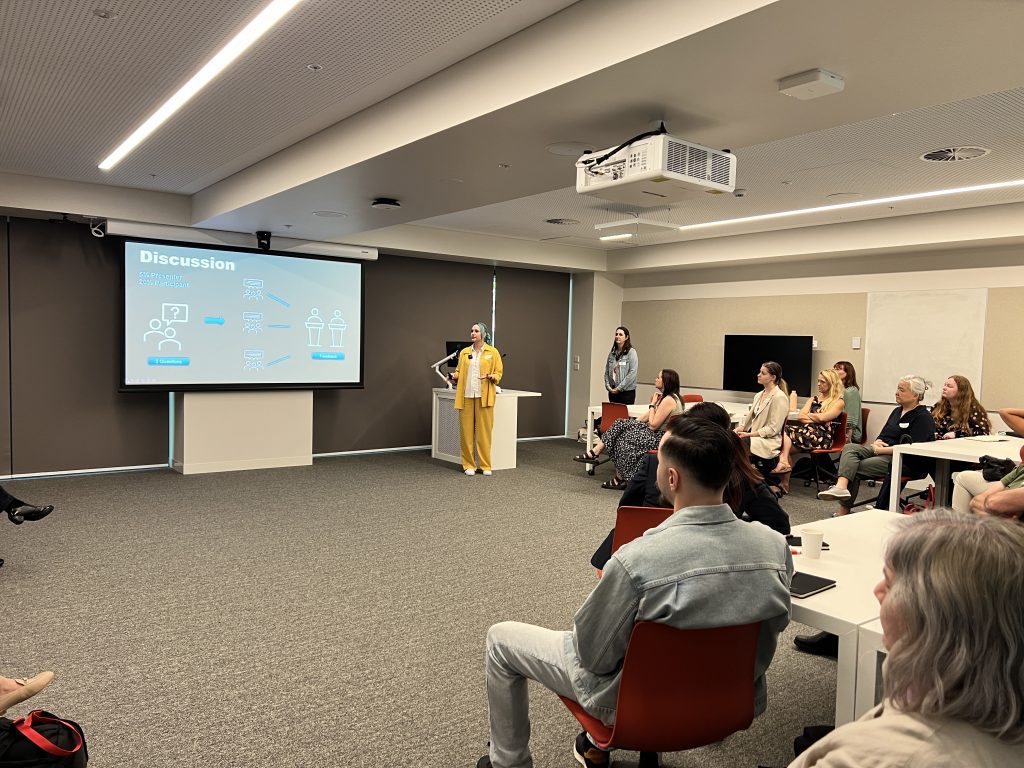

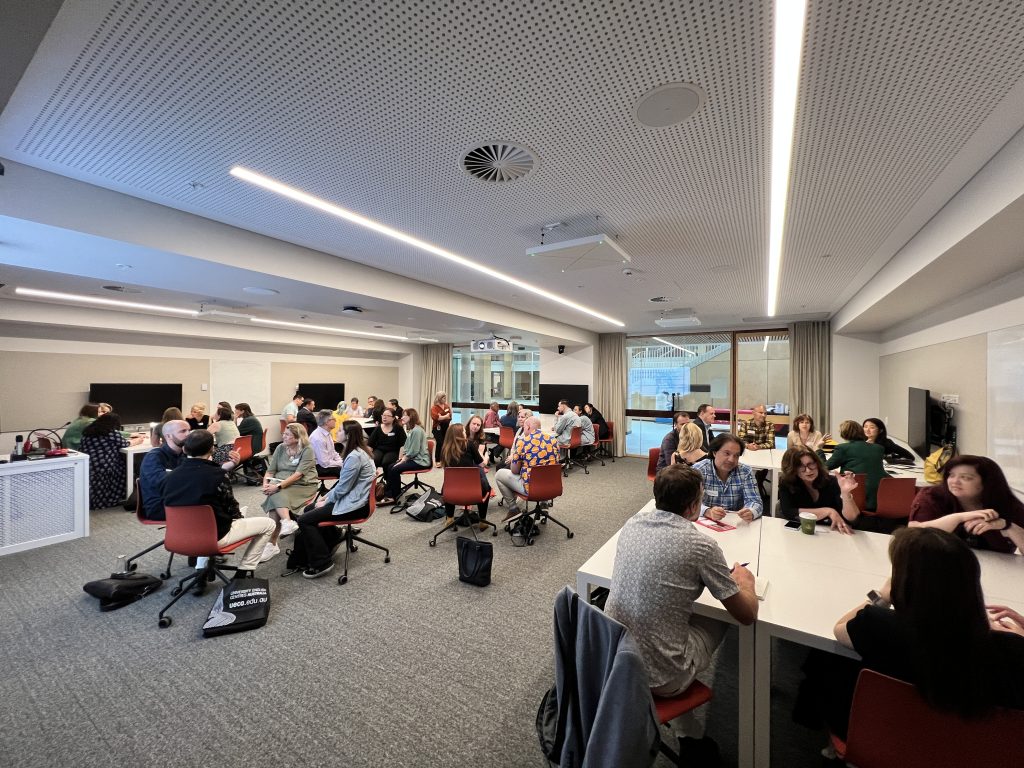
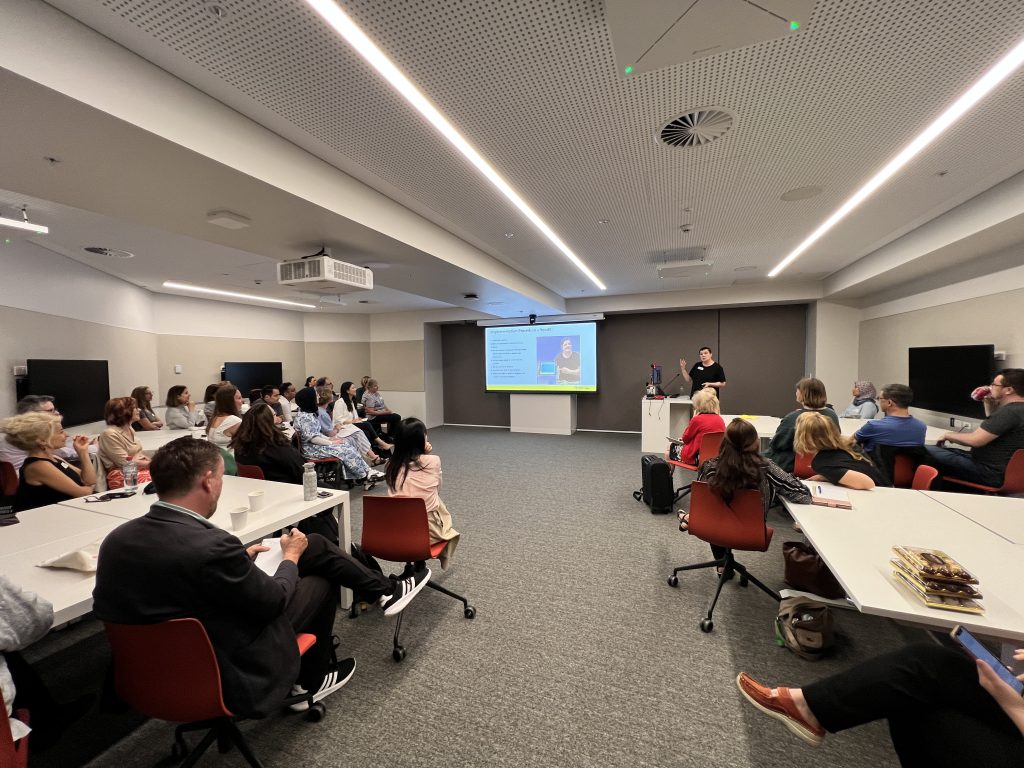

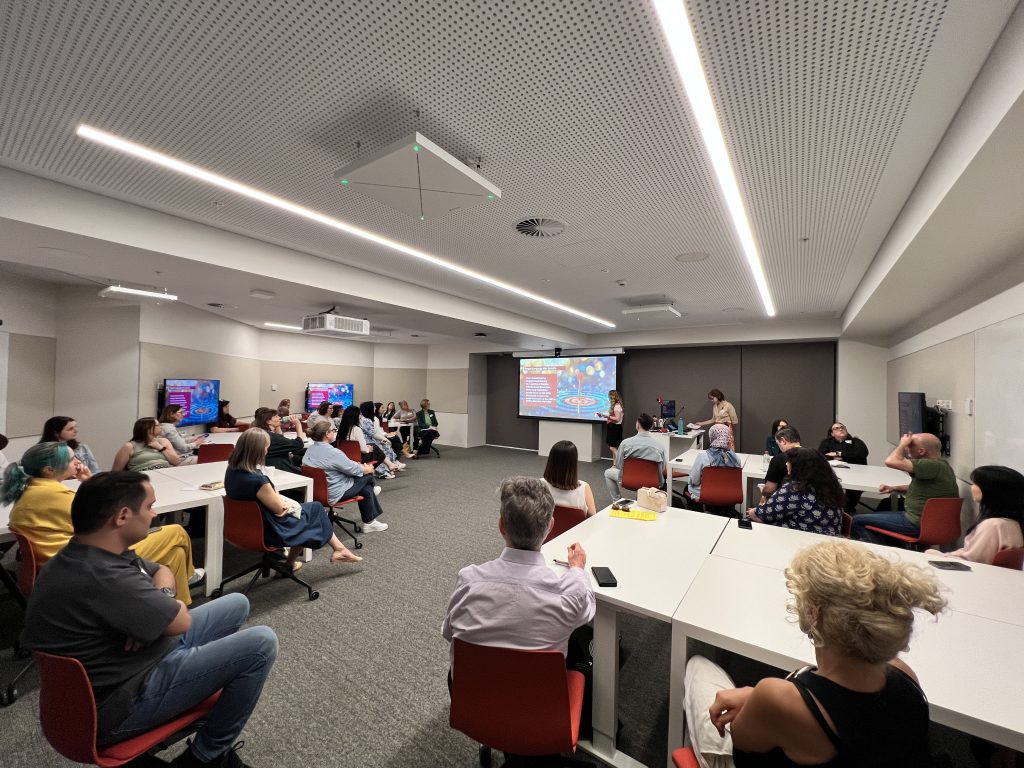
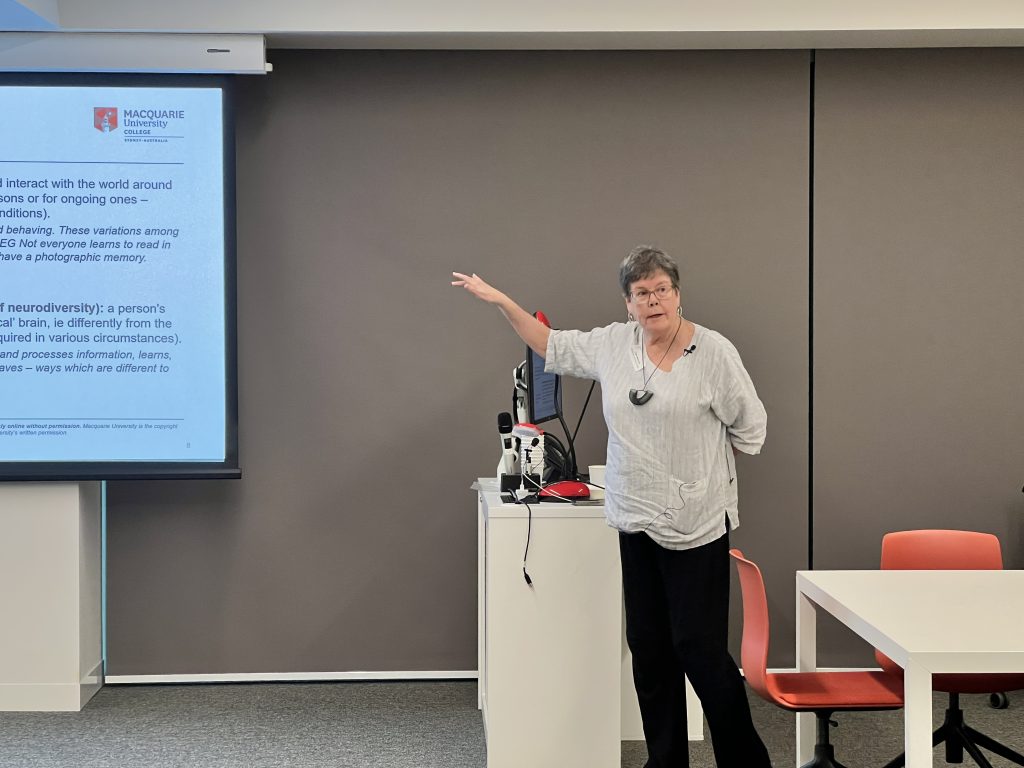
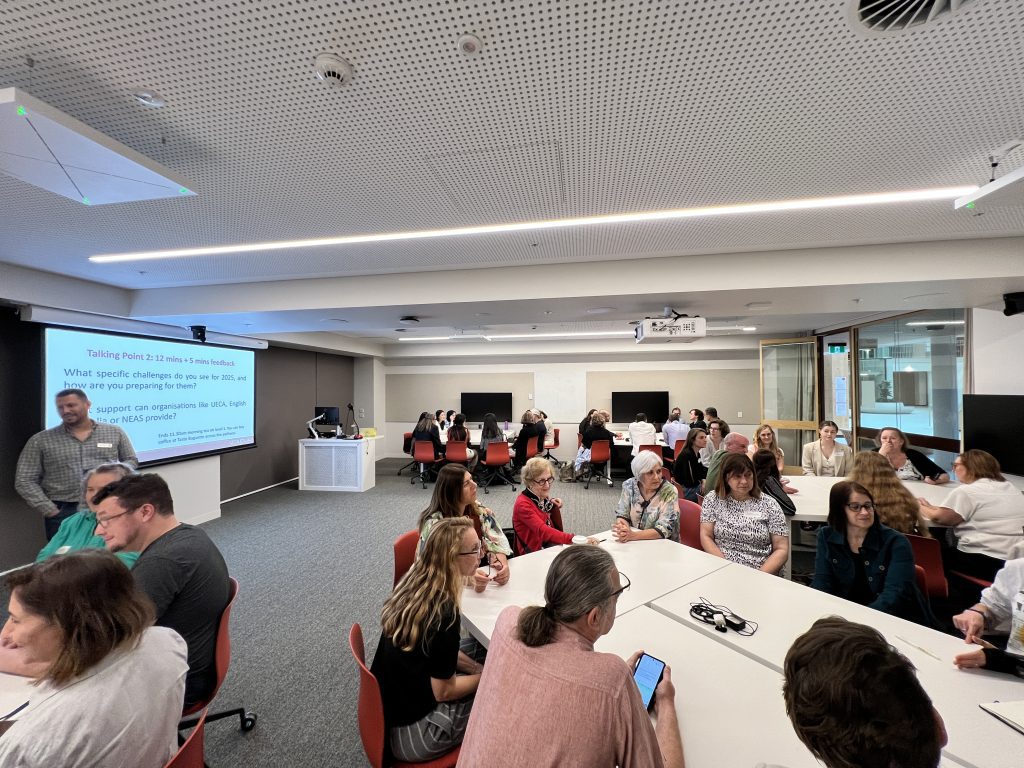

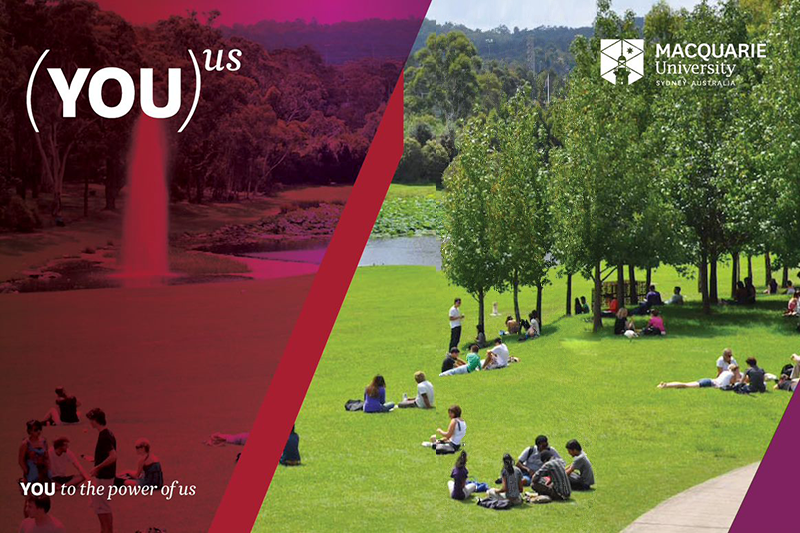
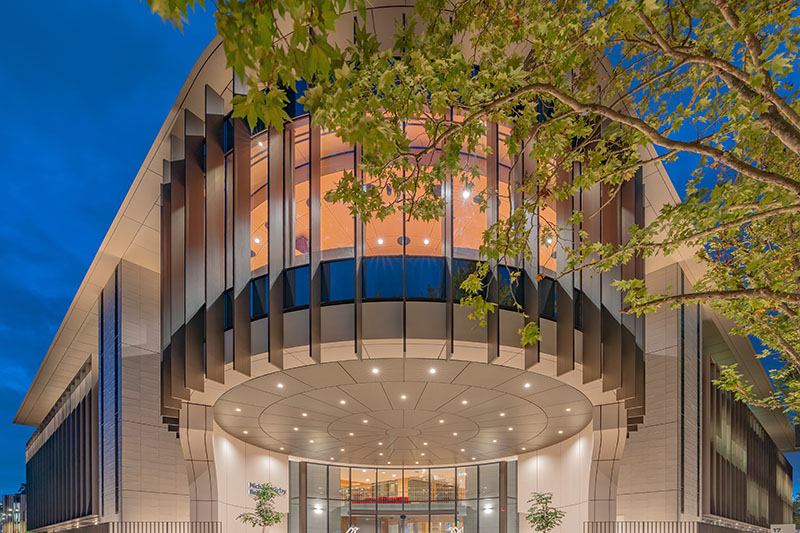
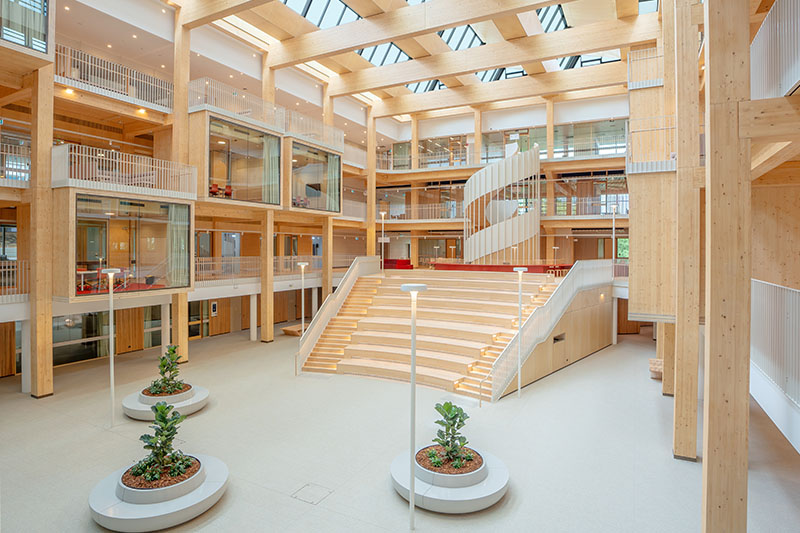
With thanks to our Event Sponsors
- ETS TOEFL
- IDP IELTS
- Language Cert
- Pearson PTE

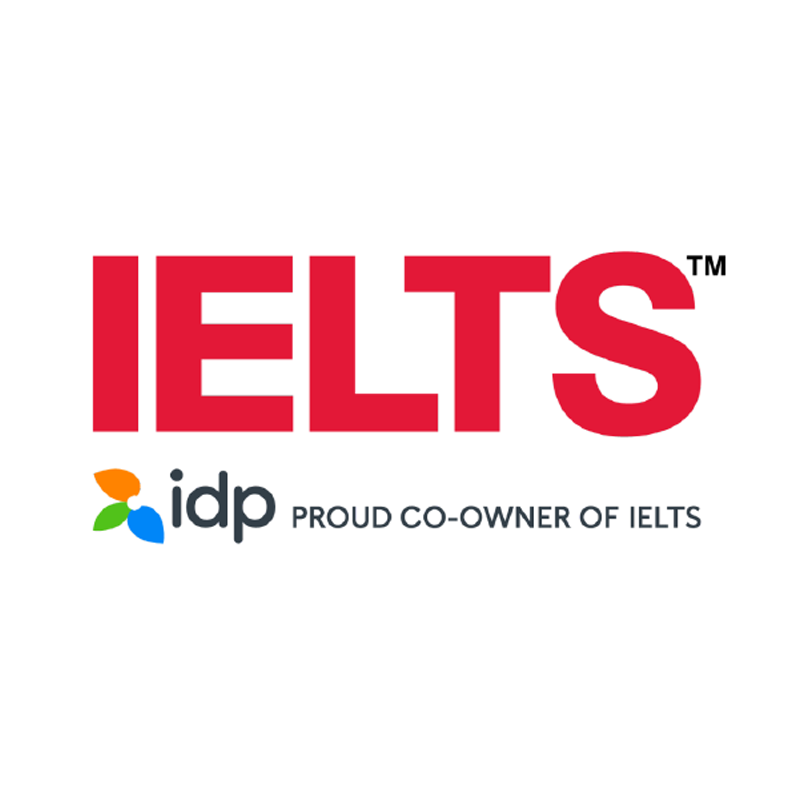

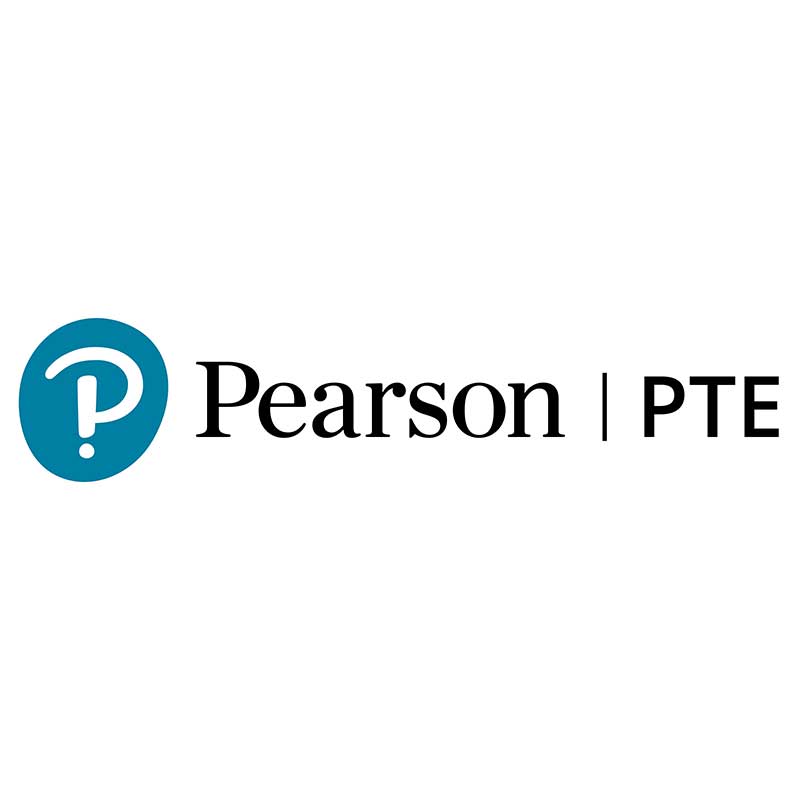
Access all content at UECA Online
You can access all videos and download presentation materials from UECA Online.
Event Program
Face to Face – Saturday, 09 November 2024
Registration
Location: Atrium
9:30 – 9:55 AEDT
Welcome
Location: G25 Lecture Hall
10:00 – 10:10 AEDT
Heather Thomas, UECA Vice President and Deputy General Manager/Director Global Programs, UOW College
Panel Discussion
Location: G25 Lecture Hall
10:10 – 10:50 AEDT
Cara Dinneen, Education Manager, Macquarie University College
Cara will host a diverse panel to discuss what it takes to be F.I.T for 2025. Panellists include Macquarie University student – Yeon Ok Kwon; Macquarie University manager – Daniel Anson; University of Newcastle English language teacher – Michelle Jenkins; UNSW College Curriculum Designer – Maria Naidoo; and Jackson Howard – Manager, English Language Programs, Western Sydney University The College.
World Café
Location: G28/G29
10:55 – 11:30 AEDT
Hosted by Cara Dinneen, Education Manager, Macquarie University College and Jose Lara, Senior Teacher, Macquarie University College
Morning Tea
Location: Atrium
11:30 – 11:45 AEDT
Session 1A – Supporting Neurodiverse Students
Location: G28
11:45 – 13:00 AEDT
Clare McGrath, Macquarie University College
Abstract
The goals of this interactive presentation are to raise awareness of neurodivergence and neurodiversity, by first looking at these terms then
- providing some examples of behaviours and attitudes we might notice in students,
- reflecting on how we interpret these behaviours and attitudes,
- noting important issues about an individual student’s awareness and about privacy,
- understanding the influence of the physical environment on ND people,
- considering the impact on task management (including group work and presentations), and finally
- sharing recommended tactics when communicating with and offering support to individual students.
Key in all of this is that most of us are not trained diagnosticians, that students may or may not be diagnosed, and that even if diagnosed they may choose not to disclose anything. Ultimately, I believe you’ll find this presentation helps us provide a more supportive and inclusive experience for ND people and indeed for all students.
I am with permission and of necessity – and with deep gratitude – basing this on the insights shared by ND teachers and academics in two English Australia webinars in April 2024 and another I then facilitated with ND colleagues, as well as readings and research suggested by them all.
Bio
For nearly 30 years, Clare has been working with ELTs from a range of contexts on their professional development, through workshops, webinars and short-term courses as well as with teacher trainees aiming to gain their initial teaching qualifications. She also works with lecturers from a range of disciplines such engineering and marketing, helping them to develop their awareness of and skills in teaching as well as designing and using resources. Clare chairs the Learning and Committee at SIBT. You may also know her as one of the admins of AusELT on Facebook.
Session 1B – Unpacking academic language demands in emerging university assessments
Location: G29
11:45 – 13:00 AEDT
Katherine Olston, Sydney University CET
James Heath, UNSW
Abstract
EAL students commencing study at Australian universities face many challenges. These include the unfamiliar academic genres and language demands of their disciplines, compounded by time poor teaching academics potentially lacking the metalanguage to articulate their expectations (Charlton & Martin, 2018). EAL students may prepare for these challenges on pathway or direct-entry programs, or they may access support later from Post-entry English and Academic Language (PEAL) teachers or learning advisors. However, in a rapidly evolving higher education landscape impacted by Gen AI, teaching academics are experimenting with new assessment types (Chen, 2023). These emerging assessments may present different demands to traditional assessment tasks, which has implications for those who teach academic language to students on pre-entry or post-entry programs.
In this session, we will analyse a selection of assessments incorporating Gen AI which have recently been developed in Australian universities. We will unpack the cognitive and linguistic demands of these assessments and discuss how best we can help our students develop the academic language and communication skills needed to scaffold success. This session is of interest both to ELICOS Direct Entry curriculum designers and to PEAL practitioners who need to ensure the currency and relevance of our practice.
Bios
Katherine Olston is Director Centre for English Teaching and Head of the Learning Hub at University of Sydney and convenor of the Post-entry English and Academic Language SIG. She is currently completing a PhD in educational research looking at teaching and learning of the graduate qualities in tertiary education.
James Heath, is Program Manager (PASS) at UNSW and is a deputy convenor of the Post-entry English and Academic Language SIG. He has taught and designed curricula for English and Academic Literacies in ELICOS and Direct Entry Program contexts. He currently manages the Peer Assisted Study Sessions program at UNSW Sydney.
Session 1C – EALD students with additional learning needs
Location: G30
11:45 – 13:00 AEDT
Miriam Barnes, Macquarie University College
Abstract
Complex learning challenges, such as autism, ADHD and dyslexia are typically well accommodated in primary and high schools. TESOL teachers are adept in differentiating content according to English language levels. However, many TESOL training courses do not teach practitioners how to accommodate more complex learning needs. Consequently, the transition from high school to higher education can be challenging for many students. This is compounded for EALD students living with additional learning needs. This interactive session will encourage critical thinking regarding the needs of this group of students. Practical activities will equip participants with a toolbox of differentiation techniques which can be incorporated into pathways and TESOL classrooms.
Bio
Miriam Barnes holds a Master’s in applied Linguistics & TESOL (Macquarie University, 2019) and a Bachelor of Languages (Honours) in French, Spanish & Latin American Studies (University of Sydney, 2016). She has taught literacy skills to primary and high school students, and has years’ experience as a teacher trainer (preschool, primary & high school), with a focus on literacy and reading disorders. Having taught in Australia, Spain & Switzerland, Miriam joined Macquarie University College in 2022, where she is currently teaching on English, English Medium Instruction and Foundation programs.
Session 1D – GenAI and Students’ Pronunciation Perceptions
Location: G10
11:45 – 13:00 AEDT
Heather Sparrow & Gabriel Azpilcueta, ELC University of Adelaide
Abstract
This year, we had the privilege to work as co-researchers and be acknowledged as Finalists on the prestigious English Australia Cambridge 2024 Action Research in ELICOS Program. Our Action Research project, titled ‘An inquiry into how the use of Generative AI applications affects students’ perceptions of pronunciation’ which we presented at this year’s English Australia Conference in Perth, Western Australia. Our research trialled a pioneering, uniquely innovative mixed-method approach using our ELT expertise to combine Gen AI tools with traditional pronunciation teaching and learning methodologies to support our international student learners’ pronunciation needs during their studies in an intensive Australian university pathway program.
As we approach 2025, it is essential for educators to remain ‘F.I.T. – Flexible, Innovative, and Transformative’ as per the UECA PD Fest theme – to meet the evolving needs of our students. In this interactive, hands-on workshop teachers will learn about our research and gain a practical method and strategies for flexible design of pronunciation lessons tailored to their cohorts’ pronunciation needs, with a unique combination of GenAI tools with traditional pronunciation teaching and learning methodologies. This workshop empowers teachers to implement transformative principles in their teaching by promoting learner autonomy for students to take responsibility for their own learning, integrating AI technologies with the central role of the human-teacher, and instilling a lifelong learning mindset that goes beyond our students’ time at our Language Centres.
Bios
Heather Sparrow teaches at The University of Adelaide’s English Language Centre (ELC), has supported EAL students as University Academic Staff, is the ELC’s Artificial Intelligence (AI): an Exploratory Community of Practice (CoP) co-founder, a 2023 English Australia Award for Innovation Finalist, co-researcher and Finalist on the prestigious English Australia Cambridge 2024 Action Research in ELICOS Program, and researcher on the award-winning ELC Team for the 2024 Anne Burns Action Research Grant. Heather has taught in Australia and Japan, holds a BA (cum laude) (Fairfield University), TESOL Certificate (Adelaide TAFE), and Master of Applied Linguistics: Language Program Management (Macquarie University).
Gabriel Azpilcueta is an English language teacher with extensive experience in ELICOS and international student support, nationally and internationally, across the secondary and higher education sectors. He works at the English Language Centre (ELC) at the University of Adelaide, teaching in a range of programs, is a co-researcher and Finalist in the prestigious English Australia 2024 Action Research in ELICOS Program and a mentee in the 2024 EA AMSIG Mentorship Program. Gabriel is also a researcher on the award-winning ELC Team which won the 2024 Anne Burns Action Research Grant.
Lunch
Location: Level 3
13:00 – 13:40 AEDT
Session 2A – Using AI tools to support student speaking
Location: G28
13:45 – 14:10 AEDT
Nemira Schick & Nina Inayati, UNSW College
Abstract
Artificial Intelligence (AI) technologies have great potential to support skills development of English Language learners, particularly those undertaking pathway courses to tertiary study in Australia. Recent innovations in this area have transformed opportunities for increasing learner motivation and self-determination, as well as potentially lowering the affective filters that may challenge learning experiences. This paper examines how Mentor AI (an AI-powered speech coaching tool currently in development by UNSW College) has been used together with another AI platform, both collaboratively then individually by learners, to increase their speaking confidence leading ultimately to autonomy and self-directed improvement in presentation delivery. Following teacher observation and student reflection notes collected during this process, data relating to engagement and student confidence was analysed. The results strongly indicate that both tools complement one another in supporting students’ speaking skills, particularly in preparation for a presentation project assessment task. Features such as linguistic and content-related feedback enabling students to develop their skills were explored in both tools, and students were encouraged to experiment with them to further benefit their learning. Some constraints such as access and affective issues related to video versus audio recording were noted. Both tools however have the potential to benefit students, and we believe that they can be implemented in other teaching contexts to further increase positive learning outcomes.
Bios
Nina Inayati and Nemira Schick are Education Professional Language Facilitators at UNSW College.
Nemira holds a Graduate Certificate (TESOL) from UNSW Global as well as a Doctor of Philosophy in Communication from Western Sydney University and a Bachelor of Communication with First Class Honours and the University Medal from the University of Technology Sydney.
Nina holds a Master of Education (TESOL) from the University of Adelaide and is currently pursuing a Doctor of Philosophy in the School of Education, the University of New South Wales.
Session 2B – Assessing the process, not just the product
Location: G29
13:45 – 14:10 AEDT
Zhana Hunter & Allison Orr, The University of Newcastle
Abstract
This presentation will provide an overview of a group presentation task in a direct entry program that aims at developing and assessing a variety of literacies. It involves assessing the steps students must take in researching, developing, and finalising their presentation. Throughout the process, students participate in weekly lessons to develop the many skills required for the different elements of the task. They demonstrate these in weekly scaffolded process tasks to prepare for the final delivery of the presentation to their live audience. This method allows teachers to monitor and support student progress and ensure the originality of the final product.
Bios
Zhanna Hunter has 15 years of ESL teaching experience in Australia and abroad. She is currently employed as an ELICOS Teacher at the University of Newcastle Language Centre where she teaches various levels of English Language Bridging Courses designed for students entering degree programs at the University of Newcastle.
Allison Orr has extensive experience teaching English at both high school and university levels. She taught in an international school in Hong Kong and is currently part of the teaching team at the University of Newcastle Language Centre, where she supports students in developing their English skills for academic success. Her expertise spans various levels of English proficiency, helping students successfully transition into academic studies.
Session 2C – Recognising your Teaching Excellence
Location: G30
13:45 – 14:10 AEDT
Pamela Humphreys, Associate Professor, Director of Macquarie University College and Director of the EMI Centre
Fiona Whittenbury, Head of Partnerships for Australasia at Advance HE
Abstract
Advance HE is a global member-led charity with members worldwide including in Australia, focusing on teaching and learning, governance, leadership development, and diversity equity and inclusion. Advance HE’s Professional Standards Framework (PSF) is a comprehensive set of professional standards and guidelines for everyone involved in teaching and supporting learning. It forms the basis of the Advance HE Fellowship scheme, encompassing four levels: Associate Fellow, Fellow, Senior Fellow, and Principal Fellow.
This session co -presented by Fiona Whittenbury, Head of Partnerships (Australasia) and A/Prof Pamela Humphry’s, Director Macquarie College aims to give an overview of Advance HE and the Professional Standards Framework, and to explore the categories of fellowship, including the benefits to individuals of undertaking fellowship. It will highlight the potential of fellowships for ELICOS teachers, utilising examples from Macquarie and QUT.
Bios
Associate Professor Pamela Humphreys is the Director of Macquarie University College and Director of the EMI Centre. She is a Senior Fellow of Advance HE and Senior Fellow of IEAA. Pamela is a Board member of NEAS, committee member of UECA, and a TEQSA Expert. Pamela has been involved in ELICOS, pathways and higher education for over 30 years in Europe, Asia and Australia. Her areas of interest are EMI, teacher education, academic language and learning, and language assessment.
Fiona Whittenbury has over 25 years of global experience in cross-sector partnerships and currently serves as Head of Partnerships for Australasia at Advance HE, where she oversees strategic educational initiatives across the region. Before joining Advance HE, Fiona held a management role at James Cook University, leading partnership programs in the Graduate Research School and co-chairing a national consortium of universities focused on higher degree research industry engagement. Her diverse professional background includes senior management roles at the Adelaide Symphony Orchestra and the South Australian Women’s & Children’s Hospital Foundation. Fiona also spent 10 years in the United Kingdom, including five years at The Law Society of England and Wales in International policy, representation and trade with Asia Pacific. Fiona holds a Master’s degree in Diplomacy and Trade from Monash University and Grad Cert of Conflict Resolution with Distinction from James Cook University. She is a nationally accredited mediator and conflict coach in Australia and based out of Adelaide, South Australia. “
Session 3A – Turn up the Volume – Dynamic Learning with Suno AI
Location: G28
14:15 – 14:40 AEDT
Magdalena Hoeller, University of Newcastle College of International Education
Abstract
Can you imagine your direct entry students singing a snappy little song about reporting verbs, or belting out a rap tune about discourse markers? With a few clicks of your mouse, you can make this happen. This session introduces teachers to SunoAI, or simply Suno; a generative artificial intelligence music creation program designed to generate realistic songs that combine vocals and instrumentals, or just instrumentals. Yet another AI tool on your desk – why should you care? Suno can be integrated wonderfully into your ELICOS classes – including EAP – in many different ways to promote engagement, retention, revision and multimodal presentation of contents. In this session, we will explore the power of music in relation to learning science and some practical strategies of how this free AI platform can be incorporated into your classroom.
Bio
Magdalena Hoeller is the Learning and Teaching Director at the University of Newcastle College of International Education. In this role, Magdalena leads and manages the academic team in the Foundation Studies, Degree Transfer and Pre-Master’s programs, including curriculum development, quality assurance, professional development and academic operations. A major focus of her work, which connects to her previous roles as Student Experience Manager and Academic English teacher, is on the development of a positive student journey, including aspects of wellbeing, student-centric initiatives and academic success.
Session 3B – Is Transnational Education the key to the future?
Location: G29
14:15 – 14:40 AEDT
Heather Thomas, Deputy General Manager and Director of Global Programs at UOW College Australia
Abstract
With increasing government emphasis and high growth globally, is transnational education the key to the future for Australian University English centres? Managing quality delivery and ensuring financial viability are crucial to success. This presentation will provide an overview of transnational delivery and address some of the challenges and opportunities TNE provides.
Bio
Heather is the Deputy General Manager and Director of Global Programs at UOW College Australia.
Heather is currently responsible for Student Services and Academic Quality at UOW College as well as developing and managing opportunities for the collaborative delivery of programs with offshore partners.
Her experience in the English Language sector includes teaching and managing AMEP and ELICOS programs as well as strategic development of Group Programs, English Language Support for University students and language testing. She is the Vice President/ Secretary of University English Centres Association and a Life Member of NEAS.
Session 3C – Using Digital Tools in Pedagogical Practice to Enhance Critical Literacy and Academic Skill Development
Location: G30
14:15 – 14:40 AEDT
Tania Bencic & Ava Jeon, UNSW College
Abstract
There is a greater need to use more innovative approaches to increase student collaboration, improve learning outcomes and enhance an overall learning experience for international students. The session will provide practical insights on how digital collaborative tools can be integrated into pedagogical practices to create a more interactive and student-centred learning environment that supports critical literacy and academic skills development across various language proficiency levels and course types.
The session highlights how collaborative digital tools like Miro can be used in teaching and learning to foster critical thinking, peer feedback, and student engagement in both classroom and out-of-class contexts. Using examples from English language courses at UNSW college, the session will showcase how such tools can be used to encourages student to document their learning journey, collaborate on projects, and visually communicate ideas. They can also be used to assist learners to develop essential academic skills such as communication, reflection, note-taking, presentation, and digital literacy, which are critical in both academic and professional settings. Practical examples will also be provided to illustrate how digital tools can promote peer interaction and active participation in learning, regardless of the course or assessment type to enhance overall learning.
Although Miro is highlighted in this session, broader focus is on how educators can effectively adopt student-centred and collaborative pedagogies using various digital tools. Attendees will leave with adaptable strategies to enhance student collaboration and engagement, making the session relevant to educators across disciplines and academic contexts.
Bios
Tania is a language facilitator at UNSW College with over 20 years of teaching experience. She was the joint winner of the 2018 Action Research Award for a project entitled: ‘Making Connections: Student investigations of their future disciplines within a Direct Entry EAP course’. Her current research interests lie in using collaboration, engagement and innovation to enhance the learning experience.
Ava is an educator with over 15 years of experience in diverse international settings and is currently working as a language facilitator at UNSW College. She has a passion for exploring innovative pedagogy to create student-centred, collaborative learning environments and focuses on helping international students build critical thinking, communication and research skills essential for academic success.”
Session 4A – Creating a collaborative mindset in a direct entry program
Location: G28
14:45 – 15:10 AEDT
Alejandra Vazquez & Carol Carpp, Macquarie University College
Abstract
In a world that values global engagement, being able to communicate effectively and appropriately across cultures with a diverse range of people is a highly regarded skill. Our English language classrooms provide such a rich environment for collaboration and personal growth, that it becomes easy to assume that once we provide the tasks, and put the students together, collaboration will generally follow. While this is sometimes true, without the benefit of a learning and teaching approach that purposefully cultivates values and behaviours that support a collaborative mindset, we may be missing rich opportunities to facilitate valuable personal growth that potentiate the academic gains that our programs deliver.
This session introduces a learning and assessment tool that has recently been trialled on Macquarie’s Direct Entry Program (DE). The newly developed Reflective Journal task invites students to participate, observe, journal and reflect upon behaviours that support or threaten an inclusive and collaborative culture within the classroom. Students are guided through critical reflection activities by teachers and encouraged to draw upon the purpose-built “Inclusion, Collaboration and Engagement (ICE) Framework” to promote introspection.
The ICE Framework’s three domains feature actions and behaviours that support diversity and inclusion, a collaborative mindset and cultural competence. Students use the multimodal Microsoft Sway to capture weekly entries that document their observations and reflections. The session includes reflections from students and teachers about the effectiveness and/or appropriateness of the framework, and considerations for how this learning and assessment tool can be further refined to potentiate learning.
Bios
Alejandra Vazquez is a senior teacher at Macquarie University College English Language Programs. She has over 30 years’ experience in the education industry as a teacher, curriculum and assessment developer, and teacher trainer. Her extensive teaching experience began in Argentina, where she taught on a range of programs and settings. Since 2001, she has been working at MQ College, where she has taught and managed all levels and programs – General, Academic, IELTS Intensive, TESOL Study Tours and Direct Entry programs. Alejandra holds a Master of Applied Linguistics (TESOL) and is the 2024 recipient of the English Australia Academic Manager Award.
Carol Carpp has been teaching English Language for over thirteen years. She studied Bachelor of Science at Western Michigan University majoring in Special Education before focusing on TESOL at Macquarie University. She managed the Independent Learning Centre for English language students at Macquarie for over six years. She’s passionate about collaborative techniques and the social climate within the English Language classroom.
Session 4B – Leveraging Ethical AI Instruction for EAL learners
Location: G29
14:45 – 15:10 AEDT
Naomi Savarese, Monash University College
Abstract
As AI rapidly transforms education, preparing students for an undefined future requires transformative teaching practices. This presentation examines how explicitly integrating AI into second-language education can futureproof students, equipping them with the skills and ethical frameworks necessary for the digital age.
By teaching students to ethically use AI tools, we address plagiarism concerns while enhancing academic integrity. This approach transforms students’ ability to engage critically and authentically with academic content. Instead of seeing AI as a shortcut, students learn to use it as a tool for innovation, fostering confidence and originality in their work.
The core transformative principle here is empowerment: students become informed, ethical users of AI who can navigate the complexities of the digital world. By embedding AI literacy into the curriculum, educators give students the tools to critically assess and apply AI in ways that align with academic integrity. This not only prepares them to meet future challenges but also encourages adaptability in their academic and professional pursuits.
Ultimately, this presentation advocates for a shift in how we view AI in education—from a potential risk to a transformative resource that empowers students. Through explicit instruction in ethical AI use, we cultivate adaptable, ethical scholars ready to thrive in an unpredictable future.
Bio
Naomi, an English teacher with 15 years of experience, holds a BA in Literature and an MA in Linguistics. Her recent research focuses on ethically integrating AI into English education. She is also part of Monash College’s AI Working Group, advising on AI integration in 2024.
Session 4C – UECA Tracer Study
Location: G30
14:45 – 15:10 AEDT
UECA Tracer Study Steering Committee
Awards and Networking Drinks
Location: Level 3
15:15 – 15:45 AEST
Social event. Refreshments served.
Access all content at UECA Online
You can access all videos and download presentation materials from UECA Online.
